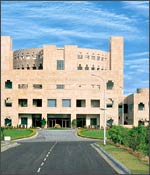|
| Help | |
| You are here: Rediff Home » India » Get Ahead » Careers » Education |
|
Every year, tens of thousands of students write the Common Admission Test, a prerequisite for admission to the Indian Institutes of Management and other business schools. This is their first step towards the much-coveted Master of Business Administration degree. The IIMs have always been top priority because of the quality of education they symbolise and also because of their sheer brand value. On the face of it, one may consider the Indian School of Business, Hyderabad, as just another competitor to the IIMs. Delve further and you will realise the two institutions are as different as chalk and cheese. How ISB is different ISB conducts a one-year MBA programme; most other business schools in India conduct a two-year programme. The advantage, here, is mainly that one can go back to work that much faster. An additional year of study is potentially an additional year of income lost. However, this does not lessen the ISB degree's value in any way. There are no breaks in the one-year programme, which is a lot more rigorous than its two-year counterpart. Secondly, unlike most B-schools which have a large influx of fresh graduates, the ISB insists its applicants have prior work experience. Deepak Chandra, assistant dean, Centre for Executive Education, ISB, explains, "We insist on work experience because it enhances the course for the students. They are able to relate to the managerial concepts they learn because they have already been a part of an organisation. It's not just theory that is constantly bombarded at them." There is another reason why studying at ISB means you can enter the job market that much faster; business networking begins as you study. Says Rahul Choudaha, manager -- admissions, ISB, "Often, fresh graduates get into an MBA programme without knowing what they want out of it. A few years of experience often gives you clarity and you will know what excites you and what puts you off." Faculty The ISB is associated with three top global business schools, namely the Kellogg School of Management, The Wharton School and London Business School. There is a judicious mix of international and resident faculty. Besides, the faculty includes research members, ie teachers who are working on and researching their areas of specialisation. Curriculum, specialisations The one-year programme is divided into eight terms, lasting six weeks each. The basic or core subjects are taught in the first four terms. In the final four terms, the students choose their specialisations and are taught the elective, or specialised, subjects. The subjects that a student can specialise include:
Additional programmes Apart from the course subjects, students undertake a few additional programmes. They are advised to experiment as much as possible in the first six months, so that they can identify the area of their interest and choose their specialisation accordingly.
Placements ~ More than 95 per cent of the students receive placements. ~ Last year, students received 442 offers, of which 436 were lateral offers. In a lateral placement, you begin your career at a level that is higher than an entry level post at an organisation. ~ While 399 out of the 442 offers were from domestic companies, the remaining were international. Major companies that offer placements at ISB include CNN-IBN, Citibank, Covansys, Cognizant, GENPACT, EDS, Satyam, Wipro, Infosys, McKinsey, Microsoft and Ernst & Young. ~ While the highest international salary was $ 2,33,800, the average domestic salary offered to the students was Rs 11,77,000. If an applicant has given the CAT and not the GMAT, he may be given conditional admission and will have to then appear for the GMAT. To confirm his admission, he will have to secure a score of at least 690. International students have to give the TOEFL. Work experience is another important qualifying factor. A majority of the students at the ISB have at least four to five years of work experience. There are a few students who have less than two years of experience as well. Students have to live on campus; it costs Rs 1,26,000 for a shared (two to four people) flat and Rs 2,16,000 for a studio flat. Students are also required to possess their own laptop. Scholarships are need-based and merit-based. Other details regarding admission and the date of application are available on www.isb.edu. "Students must realise," says Choudaha, "that an MBA is an investment of a lifetime. They must know what they are getting into and must not jump into an MBA just because of the fat pay packets on offer. Certain students do an MBA at ISB because they want to make a function shift, ie they want to move from the technical field to the managerial field in their own company. Others wish to make a complete sector shift. For example, a manager in an IT company may want to be an account manager in an ad agency." Address Phone: (040) 23187474 Fax: (040) 23007099 Email: admissions@isb.edu Web site: The Indian School of Business Are you stuyding at ISB? Are you a former student? Share your feedback about your course and about ISB with Get Ahead readers. | |||||||||||||||||||||||||||||||||||||||||||||||||||||||||||||||||
|
|
|
| © 2008 Rediff.com India Limited. All Rights Reserved. Disclaimer | Feedback |
